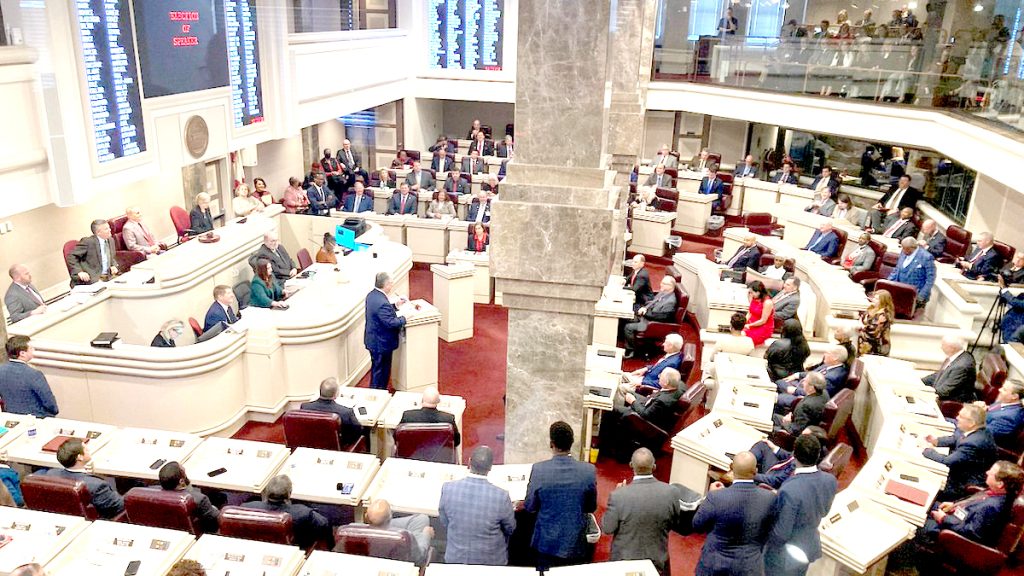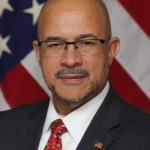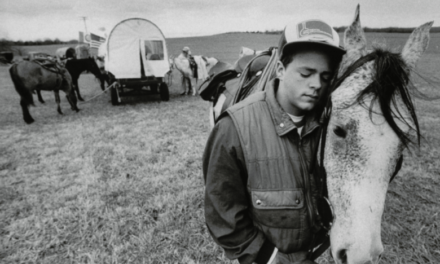By Mike Cason
Most of this year’s priorities for Gov. Kay Ivey and Republican legislative leaders were passed by the time the annual session ended Thursday evening, with one big exception.
A constitutional amendment to allow voters to decide whether to authorize a lottery, casinos, and statewide regulation of gambling never came up again after failing by a single vote on April 30.
It was the closest legislators have come to putting the lottery question on the ballot for voters in 25 years.
Ivey said Thursday she had no plans to call a special legislative session to force lawmakers to take another look at the plan, saying it would be a waste of time and money after lawmakers failed to reach a consensus during the regular session.
The Legislature passed most other bills that the Republican governor and GOP lawmakers deemed important, including what Ivey said was her No. 1 priority, a school choice plan to allow parents to use taxpayer dollars to help pay for private school. HB129 by Rep. Danny Garrett, R-Trussville, the CHOOSE Act, creates education savings accounts (ESAs), which provide eligible parents up to $7,000 a year for private school tuition and other education expenses.
“While our state has a strong public education system, all Alabama families will soon have the right to choose their children’s schools,” Ivey said when the bill passed.
Republicans, who hold about three-fourths of the seats in the State House, strongly supported the CHOOSE Act.
Democrats opposed the bill, noting that the ESAs will be paid for with dollars that would otherwise go to public schools. Democrats said ESAs won’t be much help to families in rural areas with limited options for schools and transportation.
“This is the new segregation,” Senate Minority Leader Bobby Singleton, D-Greensboro, said. “We’re just paying for it this time. Paying for it on the backs of poor children.”
Workforce bills
A notable bipartisan effort was passage of the “Working in Alabama” legislative package, backed by the Business Council of Alabama and by the governor. The bills are intended to improve Alabama’s workforce participation rate, one of the lowest in the country. Lt. Gov. Will Ainsworth led a commission that developed ideas, and House Speaker Nathaniel Ledbetter appointed a labor shortage study group.
The bills included a tax credit program to help fix what officials said is a shortage of quality, affordable child care that makes it harder for some people, especially single mothers, to work or return to work. The bill authorizes tax credits for employers who invest in childcare centers for their employees, tax credits to private childcare centers, and grants to centers to expand or make improvements.
Another tax credit bill created the Alabama Workforce Housing Tax Credit. The credits are intended to be incentives for developers to build housing that would offer rents that would be affordable for people entering or returning to the workforce.
Another bill in the package renames the Alabama Department of Labor as the Alabama Department of Workforce and consolidates responsibilities for workforce development under the agency.
The package also includes legislation to establish a public corporation, the Alabama Growth Alliance, to create and maintain a long-range economic development strategy for the state.
Another bill, the Alabama Workforce Pathways Act, establishes a category of high school diplomas for students who earn career and technical certifications aimed at helping them begin their work careers when they graduate high school.
Restrictions on help with absentee voting, diversity programs
Some Republican-backed bills passed over staunch opposition from the Democratic minority.
One of those, SB1 by Sen. Garlan Gudger, R-Cullman, established new criminal penalties for people who help another voter obtain or turn in an absentee ballot application, with exceptions. Republican supporters said the intent was to stop ballot harvesting, efforts by third parties to influence elections through the mass distribution and collection of absentee ballots.
Democrats said the bill was unnecessary because supporters gave no evidence that ballot harvesting is happening. Civil rights and voter advocacy groups opposed the law and said it would block long-established efforts to help voters who need assistance, including elderly, homebound, and eligible voters who are incarcerated. The Alabama State Conference of the NAACP, Greater Birmingham Ministries, the League of Women Voters of Alabama and the Alabama Disabilities Advocacy Program filed a federal lawsuit to block the law, which is scheduled to take effect with the general election in November.
Republicans and Democrats also disagreed sharply over a bill to ban diversity, equity, and inclusion (DEI) programs at state colleges and within state agencies. SB129 by Sen. Will Barfoot, R-Montgomery, also prohibits colleges from allowing individuals to use a restroom that is different from their sex as assigned at birth.
New statewide high school for careers in health
Another bipartisan effort was passage of a bill to establish an independent, residential high school to help students, especially those in rural areas, prepare for careers in health care. The Alabama School of Healthcare Sciences will be in Demopolis and could open in the fall of 2026.
Ivey called for the establishment of the school during her State of the State address in February.
Students will study courses focused on science, technology, engineering, math, and medicine (STEMM).
It will be the fourth statewide magnet school that is focused on a specialized area of study. The others are the Alabama School of Fine Arts in Birmingham, the Alabama School of Math and Sciences in Mobile, and the Alabama School of Cyber Technology & Engineering in Huntsville.
Other bills that passed
Property taxes: HB73 by Rep. Phillip Pettus, R-Killen, caps increases in assessed values on residential and commercial property to 7% of the assessed value from the prior year.
First-grade readiness: HB113 by Rep. Pebblin Warren, D-Tuskegee, will require students who did not complete kindergarten to take a test to enter the first grade.
Public records access: SB270 by Sen. Arthur Orr, R-Decatur, will require government agencies to respond to requests from residents to view and obtain copies of public records within certain timelines. Previously, Alabama’s public records law did not require agencies to respond to records requests by any certain times, cited by the Alabama Press Association and others as a major weakness in the law.
Seafood labeling: HB66 by Rep. Chip Brown, R-Mobile County, requires Alabama restaurants and grocery stores to disclose if their seafood is imported or domestic.
Labor unions and tax incentives: SB231 by Sen. Arthur Orr, R-Decatur, prohibits a company that voluntarily recognizes a union or does not hold a secret ballot during union elections from receiving the tax incentives that Alabama uses to recruit industry.
Clergy and sex with minors: HB125 by Rep. Leigh Hulsey, R-Helena, makes it a felony for clergy to have sexual interactions with anyone younger than 19 under certain circumstances, a law modeled after Alabama’s law prohibiting teachers from having sexual relationships with students.
Making false reports to police: HB82 by Rep. Mike Shaw, R-Vestavia Hills, increased the penalty for making a false police report from a misdemeanor to a felony if the report alleges imminent danger to a person or the public, a bill that came in response to the Carlee Russell hoax in Hoover last year, which caused a massive and expensive search effort.
Child labor: SB119 by Sen. Robert Stewart, D-Selma, increases civil and criminal penalties for child labor violations.
School security: SB98 by Sen. Arthur Orr, R-Decatur, sets up new requirements and standards for school safety inspections and creates a fund to award grants to local school boards to improve school security and safety. Gov. Ivey said the school security program was a priority.
Presidential candidate certification: SB324 by Sen. Merika Coleman, D-Pleasant Grove, changed the deadline for political parties to certify their presidential candidates for the November election because the Democratic convention comes after the deadline this year. The Legislature has previously passed similar bills to accommodate both parties during presidential election years.
Legal protections for IVF: SB159 by Sen. Tim Melson, R-Florence. After an Alabama Supreme Court ruling that frozen embryos held in storage had the legal status of children for purposes of civil liability under Alabama’s wrongful death of a minor law, the Legislature moved quickly to provide some legal immunity for in vitro fertilization clinics, although questions remain about the liability posed by the court’s ruling.











